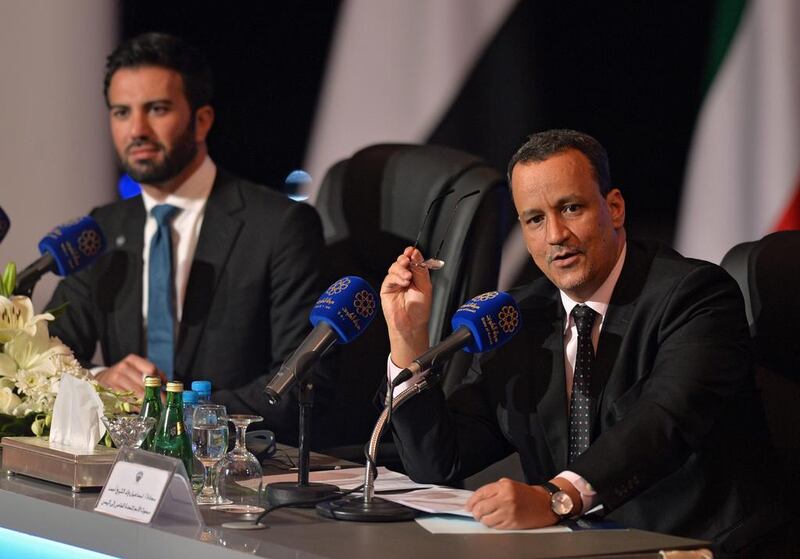KUWAIT CITY // Yemen’s government and Iran-backed rebels agreed on Tuesday to free half of the prisoners and detainees held by both sides, in the first breakthrough in peace talks that began last month.
The deal came during a meeting of the joint working group on prisoners and detainees formed by UN special envoy Ismail Ould Cheikh Ahmed.
“It was agreed during the meeting to release 50 percent of the prisoners and detainees within the next 20 days,” said Mane Al Matari, media adviser to Yemen’s foreign minister who heads the government delegation.
A source close to the Houthi rebel delegation confirmed the agreement to release half of those held by both sides, describing it as “an exchange of prisoners”.
However, another Houthi delegate Naser Baqizqoz, who represents the prisoners’ committee at the talks, said the session had only considered a proposal, not agreed on it.
Yemen’s crisis began in September 2014 when the Houthis, who are allied to Yemen’s former president Ali Abdullah Saleh, seized the capital Sanaa.
A Saudi-led Arab alliance intervened in March last year, launching a campaign of mostly air strikes against the Houthis and in support of the forces of current Saudi-backed president, Abdrabu Mansur Hadi.
A tentative UN-backed ceasefire has been in place since last month to give the peace talks in Kuwait a chance at progress. Both sides have regularly accused each other of violations.
There has been mounting international pressure to end the Yemen conflict, which the United Nations estimates has killed more than 6,400 people and displaced 2.8 million since March last year.
The two sides will meet again on Wednesday to finalise the mechanism on how and when the exchange will take place, Mr Al Matari said.
“The Yemeni government is committed to release all the prisoners as per the agreement,” he said.
Mr Al Matari estimated that their number is in the “thousands”, but the rebel source said there may be only hundreds of prisoners involved.
Following a two-day interruption, the two delegations resumed face-to-face talks on Monday after mediation efforts and an appeal by the UN envoy.
Mr Cheikh Ahmed warned on Monday that the conflict was at a critical juncture.
“There is no doubt that we are at a true crossroads. We are either moving towards peace or going back to square one,” he said.
Hours after the talks resumed on Monday, Saudi air defences intercepted a ballistic missile fired from Yemen, the coalition said.
Before that, coalition aircraft hit a military base captured by rebels north of Sanaa, killing at least 11, a military official said.
Two other working groups, who are discussing military, security and political issues, also met on Tuesday but failed to make any progress on the thorny issues facing them, sources close to the two delegations said.
Those issues include implementing a UN Security Council resolution which orders the Houthis to pull out of territory they occupied in a 2014 offensive and surrender heavy arms they captured.
The two delegations remained far apart as the rebels demanded the formation of a consensus transitional government to handle other issues but the delegation of Mr Hadi insisted he is the legitimate head of state, the sources said.
Last month, a Houthi delegation presented a plan to the United Nations for a transitional government to oversee a handing over of arms and freeing of political prisoners before elections.
Yemen’s government wanted the Houthis and forces loyal to Saleh to hand over weapons and withdraw from cities captured last year before starting any dialogue.
The Yemen conflict pits the pro-Iranian Houthis and their allies loyal to Mr Saleh against forces fighting to defend Mr Hadi’s internationally recognised government.
Pro-government forces pushed the rebels out of five southern provinces last year with air and ground support from the coalition.
But the Houthis continue to control the capital Sanaa as well as large parts of the country’s north and west.
Coalition spokesman Ahmed Assiri told Egyptian Dream television on Monday that if Kuwait peace talks fail “we will storm the capital Sanaa and decide the battle in Yemen” by military means.
The talks follow two failed peace attempts in June and December last year in Switzerland.
The Houthis exchanged prisoners with Saudi Arabia in March after unprecedented talks mediated by tribes along the frontier, where dozens have been killed in cross-border shelling.
* Agence France-Presse and Reuters





